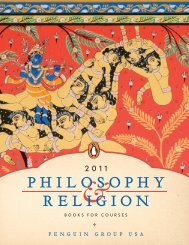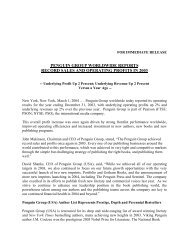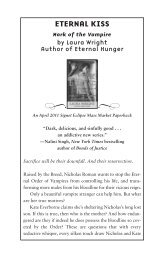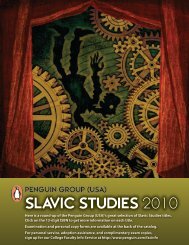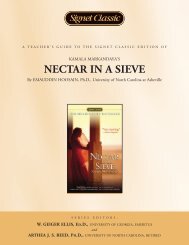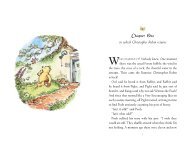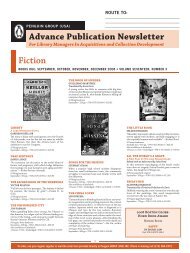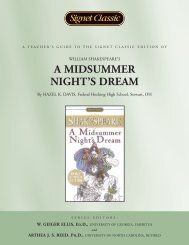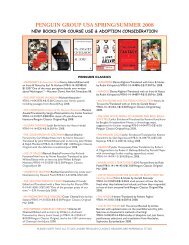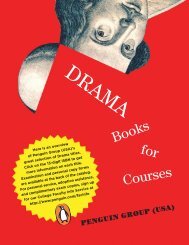Twelfth Night TG - Penguin Group
Twelfth Night TG - Penguin Group
Twelfth Night TG - Penguin Group
You also want an ePaper? Increase the reach of your titles
YUMPU automatically turns print PDFs into web optimized ePapers that Google loves.
A Teacher’s Guide to the Signet Classic Edition of William Shakespeare’s <strong>Twelfth</strong> <strong>Night</strong> 7<br />
and put the most frequently mentioned each on a sheet of paper and post the sheets around the room. Next ask the<br />
students individually to put a number on how long it took in each of the cases for the people involved to fall in love and<br />
put those numbers on the sheet under the appropriate cause. Then ask, “How long does it take to fall in love?” Again,<br />
there’s no right answer, of course.<br />
At this point, give students copies of the Duke’s first commentary on love—”If music be the food of love, play on” etc.<br />
(p. 3), perhaps written out as an essay rather than laid out on the page as a poem, and ask them what they think of it as<br />
something someone wrote when asked about LOVE. Corny? Well, that may not be too far from the reactions of some<br />
members of the audience and who knows what the Bard meant it to be.<br />
3. If students can handle the question, ask them to consider why people make fun of other people? Have some examples—<br />
the comic strips are a good source as are incidents you’ve heard in school or that have happened to friends—in hand. Then<br />
ask them to write a scene in which someone makes fun of someone else in an especially nasty way. Share the results. Then<br />
ask them to consider the emotions of the person on the receiving end and ask, “When is it OK to make fun of someone<br />
else?” and “How far is it OK to go?”<br />
4. If these activities are too analytic for the students who are about to study <strong>Twelfth</strong> <strong>Night</strong>, follow up Activity One by playing<br />
in class one of the funny episodes identified by a number of students and asking them, “Well, what did you think? Was<br />
it funny? If you thought so, why?”<br />
5. <strong>Twelfth</strong> <strong>Night</strong> follows a fairly conventional pattern in effect for drama in Shakespeare’s time and for several centuries<br />
thereafter. It has five acts and a number of scenes in each act. The characters are introduced at the beginning of the play,<br />
and the comic action begins. Through the next couple of acts the comic action becomes more involved (similar to the<br />
rising action of a tragedy), and then in the last act all the mess that has been created earlier is suddenly worked out. There<br />
are also commentaries by an observer (here Feste), misunderstandings that led to conflict, and so forth. Again, students<br />
can prepare themselves for dealing with these conventions by looking at the romantic comedies they watch on TV or in<br />
the movies. And, again, the conventions of plays like <strong>Twelfth</strong> <strong>Night</strong> are remarkably similar to the conventions of those TV<br />
programs and movies. To prepare students for reading the play, a look at how TV sitcoms are structured can give them a<br />
pattern that will be familiar to follow.<br />
6. The text of the play contains a “Cast of Characters,” as do most popular TV programs and movies. A discussion of each of<br />
the characters with a limited amount of information about each provided in contemporary terms by the teacher may be<br />
helpful. For example, the Duke of Illira is a really rich guy who wants to fall in love and has picked a woman who doesn’t care<br />
for him or want to fall in love with anyone. So, who might play the part? The eventual cast (or casts) of actors from the popular<br />
media might be blown up to poster size and mounted on a board for future reference. Changes in casting aren’t unusual<br />
in TV or the movies, and they certainly should be made as the producers (students) move through the production.<br />
WHILE READING THE PLAY<br />
The activities suggested during the reading of the play are intended to be carried out as preliminary to decisions about how<br />
the play might be dealt with as a modern movie or TV romantic comedy. Therefore, for example, students who are speaking<br />
lines from the play or carrying out the actions of characters should see what they are doing as if deciding what’s being said and<br />
done and how it fits into the idea of a modern counterpart, rather than trying to become trained Shakespearean actors.<br />
1. Consider the title. What can twelfth night mean? Many, perhaps most, students won’t know about the Feast of the Epiphany,<br />
but they certainly will have heard the song “The Twelve Days of Christmas.” Knowing that <strong>Twelfth</strong> <strong>Night</strong> is the last of the<br />
days of the song probably won’t help them much, so they’ll have to be told that in earlier times twelfth night was a time<br />
of wild celebration. Comparing it to Mardi Gras should help.<br />
The subtitle What You Will has provoked much speculation. Ask students to consider when they might say, “What you will.”<br />
One possible meaning is similar to the currently popular “whatever,” which seems to mean “I don’t care” or “it doesn’t<br />
matter,” that is, a kind of dismissal.<br />
Scholars have suggested that it is tied to the concept of the will as in willpower, willful, willing, etc. Ask students to look<br />
for as many words as possible that contain the prefix “will.” From their list, ask them to think about the various meanings<br />
of “will” and hold those meanings in mind as they read the play.<br />
2. As is suggested in a number of the works in the Bibliography, a play is a play; that is, a play is meant to be performed, its words<br />
meant to be spoken, not read silently. Gibson, in his excellent book Teaching Shakespeare, points out, “Shakespeare was<br />
essentially a man of theatre who intended his words to be spoken and acted out on stage. It is in that context of dramatic




